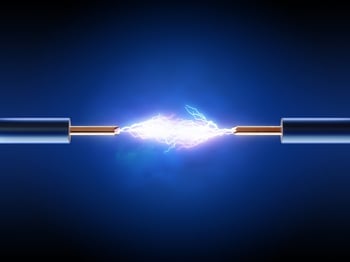
Even when your business is housed in an historic building, or one that was built more than 25 years ago, chances are you don’t think about the wiring and electrical in your building. It’s hidden behind the drywall and plaster, after all. That may be one of the reasons why so many fires in older buildings are caused by their aging electrical. Here are some of the hazards of having old electrical systems in your business:
-
Knob and Tube Wiring
Older buildings tend to have what is known as “knob and tube” wiring. This in itself is not an issue, until it’s altered, chewed by rodents or otherwise compromised. Then it becomes one of the leading causes of electrical fires, according to insurance companies.
-
Low Amp Wiring
Another major electrical fire risk factor is that old wiring can sometimes be rated for lower amps than is required by modern appliances and business equipment. This can result in the overloading of circuits, which can also cause electrical fires. Replacing breakers with arc faulty circuit interrupters can be one solution to wiring problems like this in older premises.
-
Poorly Modified Wiring
In older buildings, particularly those from the early twentieth century, it’s not uncommon for wiring to have been tinkered with over the years—often by people who had no electrical training. This can mean that there are loose live wires, badly executed connections and other problems lurking behind the walls of your commercial building.
-
Old Insulation on Wire
Insulation on older wiring tends to be less than perfect. Over the years, it may have been chewed by animals, damaged by screws or nails being placed in walls, or simply become brittle or disintegrated from age. This leaves the wire at the core of your wiring exposed, and that can lead to sparks and fire.
-
Faulty Breakers
It’s not only the wiring that is a fire risk in older buildings. If your commercial panel hasn’t been upgraded recently, then it’s entirely possible that the switches and breakers that make up the circuits might be faulty too. If they’re not working correctly, your electrical system won’t do what it is supposed to do, and it may be downright dangerous.
-
Poor Electrical Design
Poor design is another major problem for older electrical systems. Depending on the age of your building, your electrical system may have been designed to meet codes that were in force 50 or even 80 years ago. Codes and standards have changed a lot since then, and there’s a good chance that your electrical wiring would not pass an inspection—if you had to have one.
The truth is, your building doesn’t need to be very old to have outdated electrical work. If it was built in the 70s or earlier, there could be some electrical concerns hiding in your walls. If you’re not sure, then the best idea is to have a qualified commercial electric company take a look, and make sure there aren’t any major fire risks.




 Very often these days,
Very often these days, 
 Many residential (and some commercial) customers don’t realize that when they hire a general contractor to
Many residential (and some commercial) customers don’t realize that when they hire a general contractor to